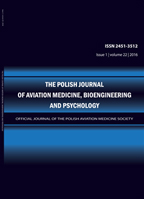2019, Volume 25, Issue 4
SAFETY OF THE USE OF HIGH-ALTITUDE PROTECTION SUITS IN PATIENTS WITH NEUROLOGICAL DISORDERS IN KINESITHERAPY
MACIEJ ABAKUMOW1, PAULINA ZIELIŃSKA2, KRZYSZTOF KOWALCZUK3
-------------------------------------------------------------------------------------------------
1Neures Poland
2Department of Otolaryngology, Military Institute of Aviation Medicine
3Department of Simulator Studies and Aeromedical Training, Military Institute of Aviation Medicine
Autor korenspondencyjny: MACIEJ ABAKUMOW; Neures Poland ; email: rehabilitacja@neures.pl
Full text
Streszczenie
Abstract: HAP (High-Altitude Protection) suits were originally developed to protect the bodies of flight personnel from the effects of low atmospheric pressure. At a later stage of their development, they were supplemented with a system to prevent the negative effects of gravitational acceleration. A new and very different application of HAP suits is their use in the kinesitherapy process for patients with neurological deficits. However, due to the possibility of cardiovascular overload and a potentially dangerous increase in blood pressure, studies have been conducted to observe the occurrence of increased blood pressure. The study was conducted on a group of 39 patients with various neurological deficits during a fiveoccupation therapy session. Previously published results obtained for 17 healthy subjects (control group) were used for comparison [2]. The WUK 90 version of the HAP suit was used during the therapy. The compared results for the control and experimental groups are similar to each other AND show no increase in blood pressure.
Słowa kluczowe
High-Altitude Protection suit, kinesitherapy, cardiovascular load, therapy safety
